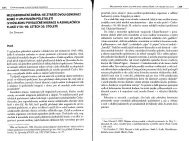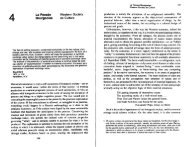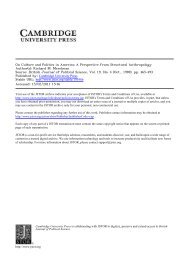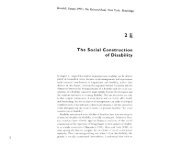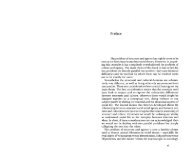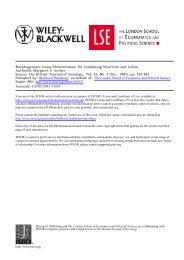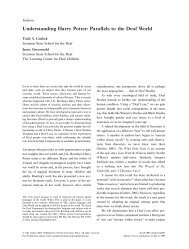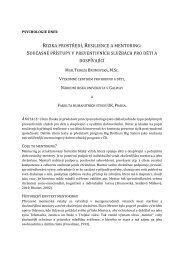Culture and Practical Reason Two Paradigms of ... - Moodle
Culture and Practical Reason Two Paradigms of ... - Moodle
Culture and Practical Reason Two Paradigms of ... - Moodle
- No tags were found...
Create successful ePaper yourself
Turn your PDF publications into a flip-book with our unique Google optimized e-Paper software.
Chapter <strong>Two</strong> 76 <strong>Culture</strong> <strong>and</strong> <strong>Practical</strong> <strong>Reason</strong><strong>Two</strong> <strong>Paradigms</strong> <strong>of</strong> Anthropological Theory77because <strong>of</strong> some <strong>of</strong> the same theoretical scruples. Texts <strong>and</strong> the people'sstatements he held rather at a discount as mere formulations <strong>of</strong>the ideal, bycomparison with the real pragmatic motives that governed men's relationsto such rules <strong>and</strong> to each other (cf. Malinowski 1966 [1926]). In all this,Malinowski inverted not only the premises <strong>of</strong> a Boasian anthropology, butthe original relationship <strong>of</strong> the anthropologist to the people. True that Boaswould end with no more underst<strong>and</strong>ing <strong>of</strong> Kwakiutl kinship thanMalinowski had <strong>of</strong> the Trobri<strong>and</strong> system. In fact, Boas was a lot moreincoherent-out <strong>of</strong> a decent respect for the unintelligibiltiy <strong>of</strong> the Indian.Boas thought the facts would "speak for themselves." Nowadays this iscommonly taken as the sign <strong>of</strong> a naive empiricism. But what was intendedin the first place was a submission to the culture in itself, a commitment t<strong>of</strong>inding the order in the facts rather than putting the facts in order (cf. Smith1959). Boas's empiricist naivety was the delusion that the order wouldreveal itself just as presented. across the texts <strong>of</strong> a thous<strong>and</strong> salmon recipes,without benefit <strong>of</strong> any underst<strong>and</strong>ing on his part. 17 Here was atotally different relation to the object. The anthropologist was reduced tothe status <strong>of</strong> a recording device: not even his own intelligence was permittedto come into play. But for Malinowski, the "savage" was pure negativity.He did not exist; Malinowski would create him: "I hear the word'Kiriwana' ... I get ready; little gray, pinkish huts ... It is I who willdescribe them or create them" (Malinowski 1967, p. 140).Utilitarian functionalism is a functional blindness to the content <strong>and</strong>internal relations <strong>of</strong> the cultural object. The content is appreciated only forits instrumental effect, <strong>and</strong> its internal consistency is thus mystified as itsexternal utility. Functionalist explanation is a kind <strong>of</strong> bargain made withthe ethnographic reality in which content is exchanged for an "underst<strong>and</strong>ing"<strong>of</strong> it. But a theory ought to be judged as much by the ignorance itdem<strong>and</strong>s as by the "knowledge" it affords. There is an enormousdisparity between the richness <strong>and</strong> complexity <strong>of</strong> cultural phenomenasuch as the Intichiuma <strong>and</strong> the anthropologist's simple notions <strong>of</strong>their economic virtues. Only the most infinitesimal fraction <strong>of</strong> that richreality, <strong>and</strong> nothing <strong>of</strong> its specific content, is accounted for by its func-17. Radin succinctly put the Boasian principle-"No one has the right to obliterate theexact fonn in which his infonnation was received"-although Radin in the same worksoundly criticizes the master's temptation to cut up the culture into traits for diffusionisltreatment, among other imperfections <strong>of</strong> historicist method (1966 [1933 J). For an excellentdiscussion <strong>of</strong> Boas's altitude <strong>of</strong> circumspection toward the phenomenon in itself,however, see his anicle "The Study <strong>of</strong> Geography" (in Boas 1966b [1940]).tion. 18 When Malinowski set out to show that "the Intichiuma ceremonies<strong>of</strong> the Australian aborigines, with their wild dances, their painted bodies<strong>and</strong> their symbolically carved shields actually performed a function in theireconomic life"-namely, that they stimulated production in anticipation<strong>of</strong> the rites (Malinowski 1912)-what in fact do we learn <strong>of</strong> these wilddances, painted bodies, <strong>and</strong> a thous<strong>and</strong> other properties <strong>of</strong> the Intichiuma?Such conceptual impoverishment is the functionalist mode <strong>of</strong> theoreticalproduction. It is only exacerbated when the function is sought on thebiological level-as is <strong>of</strong>ten true not only <strong>of</strong> Malinowski but <strong>of</strong> more recentversions <strong>of</strong> ecological anthropology (cf. Vayda 1965, p. 196; Vayda <strong>and</strong>Rappaport 1967). For the further removed the cultural fact from the sphere<strong>of</strong> utility to which it is referred-the organic, the economic, the socialthefewer <strong>and</strong> more mediated must be the relations between this fact <strong>and</strong>the phenomena <strong>of</strong> that sphere; <strong>and</strong> consequently the fewer <strong>and</strong> less specificare the functional constraints on the nature <strong>of</strong> the custom under consideration.So the less determinate will be the explanation by functional virtues;. or, conversely. the greater will be the range <strong>of</strong> alternative cultural practicesthat could equally (or even better) serve the same purpose. There must bemany ways <strong>of</strong> stimulating production other than staging an Intichiumaceremony. Indeed, the explanation rather defeats its objective <strong>of</strong> renderingcustom reasonable; for that is a bizarre way <strong>of</strong> going about one'sbusiness. To satisfy ourselves on the indeterminancy <strong>of</strong> any such explanation,it is only necessary to turn the argument around: it is advantageousto increase production-therefore the Intichiuma? Malinowski'sfunctionalist underst<strong>and</strong>ing would have been more powerful if, it laRadcliffe-Brown, he had referred the ceremony to the level <strong>of</strong> social fact.The prevailing relations between totemic clans, men <strong>and</strong> women, initiated<strong>and</strong> uninitiated would go a long way toward making the wild dances <strong>and</strong>painted shields intelligible. Less is said when economic advantages areadduced. And still less would have been gained had Malinowski carriedthrough his project to the biological level. Then the cultural content, whosespecificity consists in its meaning, is lost altogether in a discourse <strong>of</strong>"needs" empty <strong>of</strong> signification.One is tempted to formulate a general rule <strong>of</strong> diminishing returns t<strong>of</strong>unctionalist explanation: the more distant <strong>and</strong> distinct the cultural practice18. I am indebted to Frithj<strong>of</strong> Bergmann on this point, <strong>and</strong> to Raymond C. Kelly for a firstfonnulation <strong>of</strong> "the law <strong>of</strong> diminishing returns to functionalist explanation" which followsfrom it.



